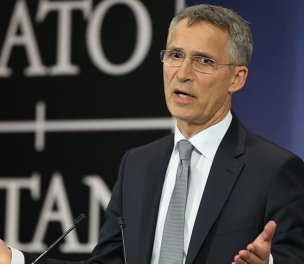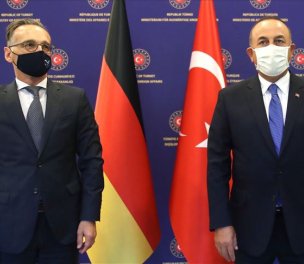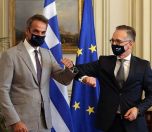Photo: Ministry of National Defense / Twitter
Click to read the article in Turkish
Turkey issued two Navtex alerts today (August 27), one for extending its Oruç Reis drillship's exploration activities until September 1 and the other for naval gunfire exercises.
The country's naval focus will conduct gunnery exercises at two different points in the Mediterranean Sea, according to the Turkish Naval Forces Office for Navigation, Hydrography and Oceanography (OHNO).
"Turkey's recent Navtex alert on gunnery drills has to do with security and safety off the coast of Iskenderun in the Eastern Mediterranean," Minister of National Defense Hulusi Akar told the state-run Anadolu Agency (AA).
The country also took part in naval training exercises with allied forces in the Eastern Mediterranean Sea yesterday, the Ministry of National Defense said on Twitter.
What is Navtex?Navtex is an international automated medium frequency direct-printing service for delivery of navigational and meteorological warnings and forecasts, as well as urgent maritime safety information to ships. It was developed to provide a simple and automated means of receiving this information aboard ships at sea within 370 km (200 nautical miles) off coast. Navtex is a component of the International Maritime Organization/International Hydrographic Organization Worldwide Navigation Warning Service (WWNWS). (Wikipedia) |
In a tweet, the ministry said joint maritime training exercises had been held with the TCG Barbaros frigate, TCG Burgazada corvette and USS Winston S. Churchill destroyer.
A day before, the two frigates participating in the "Operation Mediterranean Shield" conducted replenishment on the sea with Italy's navy oiler ITS Etna.
Greece also conducted military exercises with the US and Cyprus, France and Italy over the past two days.
This week, Turkey and Greece sent out conflicting alerts on energy exploration and military exercises in the Mediterranean.
CLICK - Back to back military drills by Greece, Turkey, Cyprus amid Germany's diplomatic efforts
Tensions over Turkey's hydrocarbon exploration activities have risen over the past month as Greece disputes Turkey's current energy exploration in the Eastern Mediterranean, which it says violates its and southern Cyprus' maritime rights.
Turkey has sent out drillships to explore for energy on its "continental shelf," saying that both Turkey and Northern Cyprus have rights in the region.
Turkish Navy continues maritime trainings with Allied navies. Turkish frigate TCG BARBAROS and TCG BURGAZADA corvette have conducted maritime trainings with American destroyer USS WINSTON S. CHURCHILL at Eastern Mediterranean on 26 August 2020. https://t.co/dZ4QBWniD1
— T.C. Millî Savunma Bakanlığı (@tcsavunma) August 26, 2020
Minister: Turkey's power shouldn't be tested
Everyone should know that the Turkish Republic has truly become a player on the international stage, Minister Akar told AA in a video interview today.
The Navtex maritime alert Turkey issued on Sunday was to ensure the safety of its naval forces in the Eastern Mediterranean during training off the coast of Iskenderun, southern Turkey, said Akar.
On disputes over maritime boundaries in the Eastern Mediterranean, Akar said that Turkey had no designs on anyone's land or sea, but it would not allow any attack on its territory from its neighbors' lands or seas.
On Turkey's borders in the Eastern Mediterranean, he explained: "We said what would happen if you violated them. But we always stress that we favor dialogue."
"Turkey favors dialogue, we want peace, but we also want our rights," said Akar, stressing Turkey's desire for dialogue.
Turkey would be happy to welcome its Greek counterparts if they decide to sit down and talk, he added.
"Turkey's power should not be tested," said Akar, reiterating that Turkey is determined and able to protect its own rights and interests.
Dialogue over the Eastern Mediterranean should be the first option, otherwise undesirable situations could follow, he cautioned.
Timeline of the Eastern Mediterranean crisisOn July 28, Turkey announced after Germany's diplomatic efforts that it suspended hydrocarbon exploration activities in the Eastern Mediterranean and stated that it was ready to talk with Greece. On August 6, Greece and Egypt signed a maritime border agreement. On August 10, Turkey announced that its drillship Oruç Reis would resume energy exploration in the Eastern Mediterranean. It said the ship will continue its work along with the ships Cengiz Han and Ataman until August 23. On August 14, the EU foreign miniters discussed the crisis at an extraordinary meeting, calling on Turkey to end hydrocarbon exploration activities in contested waters. On August 16, Turkey issued a Navtex, announcing that its drill ship Yavuz will continue its work exploring for energy resources off the island of Cyprus. On August 23, Turkey issued another Navtex, stating that the Oruç Reis vessel would continue its activities until August 27. On August 24, Greece held joint naval drills with the US in the south of Crete island. One day later, Turkey conducted naval exercises with Italy. On August 25, Germany's Minister of Foreign Affairs Heiko Maas visited Athens and Ankara to encourage the two countires to have direct talks. On the same day, Turkey held replenishment exercises with Italy in the Eastern Mediterranean. On August 26, US President Donald Trump had phone talks with President Recep Tayyip Erdoğan and Prime Minister of Greece Kyriakos Mitsotakis, urging them to reduce tensions and start dialogue. On the same day, Turkey and the US conducted joint maritime exercises. |
(VK)




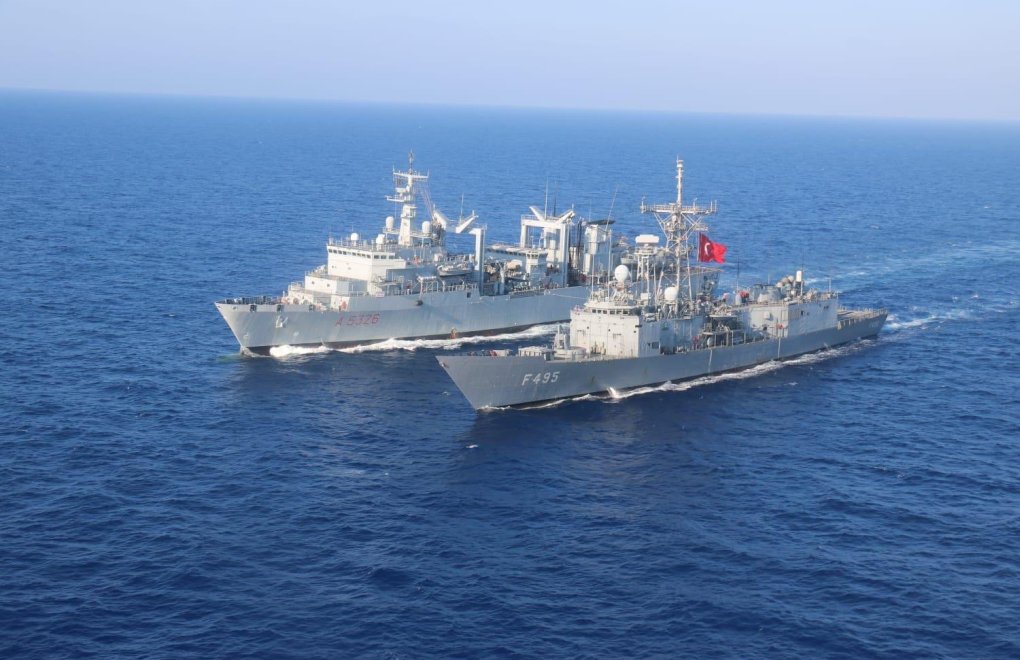
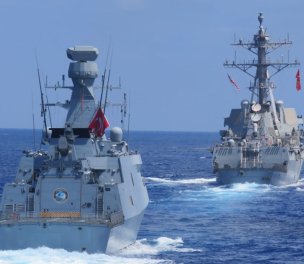
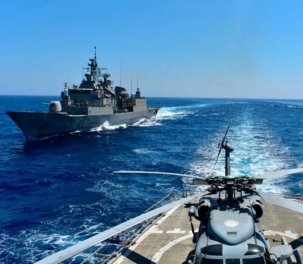

jhg.jpg)
